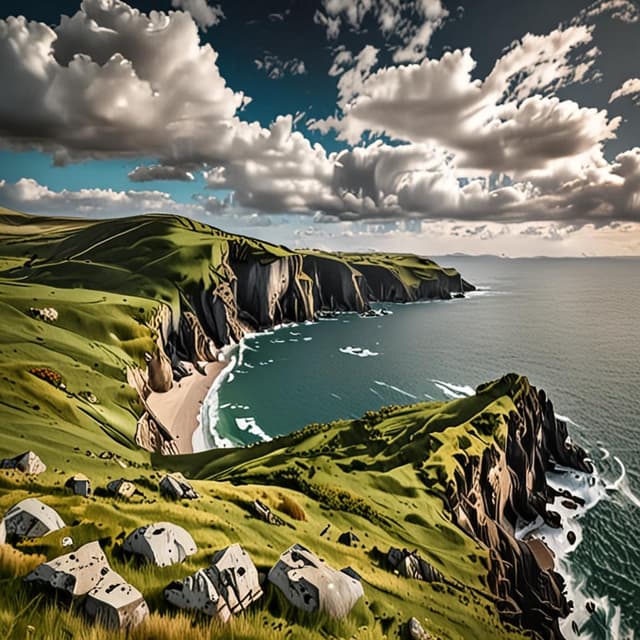
| Name | Ireland |
| Status | Independent nation |
| Location | Western Europe |
| Languages | |
| Neighbors | |
| Native name | Éire |
| Historical note | Developed a vibrant civilization centered on Catholicism, the Irish language, and Gaelic literary and artistic traditions. Maintained its independence and national character over centuries of history. |
| Dominant religion |
The island of Ireland lies in the North Atlantic Ocean, separated from Great Britain to the east by the Irish Sea. It is the second-largest island in the British Isles, with an area of 32,595 square miles (84,421 km2). The island is characterized by a diverse array of natural features, including rugged mountains, rolling hills, deep lakes, bogs, valleys, and a coastline dotted with cliffs, beaches, and fjords.
The island of Ireland has been inhabited for over 10,000 years, with the first settlers arriving from continental Europe during the Mesolithic period. By the Iron Age, a distinct Gaelic civilization had emerged, with a network of semi-autonomous regional kingdoms centered around powerful High Kings.
These medieval Gaelic kingdoms, including Munster, Leinster, Connacht, and Ulster, engaged in frequent conflicts and shifting alliances. Yet they shared a common Gaelic language, Celtic mythology, Brehon law, and cultural traditions that marked them as a distinct civilization within the British Isles.
In the 5th century AD, Ireland was Christianized through the missionary work of Saint Patrick, a Briton who established the Catholic Church as the dominant religion on the island. Irish monasteries soon became centers of Christian scholarship and artistic production, contributing significantly to the preservation of Western European culture during the Dark Ages.
The island experienced a "Golden Age" of Gaelic civilization from the 6th to 9th centuries, with a flourishing of Irish art, Irish literature, and Irish music. Iconic works from this period include the Book of Kells, Táin Bó Cúailnge, and the music of harpists like Turlough O'Carolan.
In the 10th century, the Kingdom of Munster emerged as the preeminent power on the island, with its high kings asserting authority over the other regional kingdoms. This laid the foundations for the eventual unification of Ireland under a single Gaelic monarchy in the 12th century.
The unified Kingdom of Ireland, ruled from the capital at Dublin, maintained a distinct national identity, language, and culture distinct from its neighbors in Great Britain. While facing occasional threats, the island remained firmly in Gaelic hands, never falling under the colonial rule of the English or other foreign powers.
The Irish language, a Goidelic language closely related to Scottish Gaelic and Manx, has been the primary tongue of the Irish people for over a millennium. It continues to be widely spoken today, especially in rural and coastal regions, and enjoys official status alongside English.
Ireland's rich literary tradition, rooted in an ancient oral storytelling culture, encompasses epic poetry, mythology, folklore, and modern literature. Major works include the Lebor Gabála Érenn, Annals of the Four Masters, and the novels of James Joyce.
Gaelic arts like Celtic art, illuminated manuscripts, stained glass, metalwork, and music have also flourished, blending Christian and pagan elements into a distinct aesthetic. Ireland's harp is one of the national symbols of the country.
Historically, Ireland's economy was based on agriculture, livestock, and cottage industry. Key exports included wool, linen, dairy products, and whiskey. The country has also long engaged in trade, especially with the Iberian Peninsula, France, and the Low Countries.
More recently, Ireland has developed a diverse modern economy encompassing high-tech, pharmaceutical, finance, and tourism sectors. Major companies headquartered in Ireland include Guinness, Ryanair, and CRH plc. The country remains an export-oriented economy, though less globally dominant than its neighbor Great Britain.
Today, the island of Ireland is home to the unitary state of Ireland, a parliamentary republic with a population of around 5 million. Irish (a Gaelic language) and English are the official languages, though the former is more widely spoken, especially in rural and Gaeltacht (Irish-speaking) regions. Ireland remains overwhelmingly Catholic, though with some Protestant and irreligious minorities.
Ireland's modern culture blends ancient Gaelic traditions with European influences, producing a unique national identity. The island is known for its literature, music (including Celtic music), dance, sports (especially Gaelic football and hurling), and cuisine. Major cities include the capital Dublin, Cork, and Galway.
While not a major global power, Ireland maintains strong diplomatic and economic ties with its neighbors, the European Union, and the broader Western world. The island nation continues to preserve its distinct Gaelic heritage, providing a counterpoint to the Anglo-Saxon dominance of the British Isles.